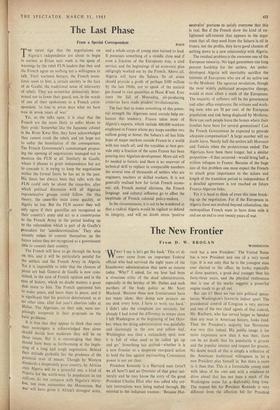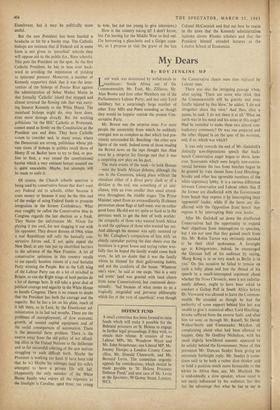The New Frontier From D. W. BROGAN
WASHINGTON
WHAT I say is let's get Ike back.' This cri de cur came from an important Federal official who had survived the eight years of the Eisenhower administration that seem so remote today. 'Why?' I asked, for my host had been a vivacious critic of the dead administration, especially in the heyday of Mr. Dulles and such purifiers of the body politic as Mr. Scott Macleod. 'Because these new frontiersmen have too many ideas; they dump new projects on my desk every hour. I have to work too hard.' 1 didn't take the complaint too seriously, for already I had noted the difference in tempo since I left Washington at the beginning of last Octo- ber, when the dying administration was painfully and alarmingly in the sere and yellow leaf. Washington was then a melancholy spot; now it is full of what used to be called `git up and go.' Something has arrived—whether it is a new frontier or a desperate rearguard action to hold the line against encroaching Communist power is not yet clear.
President Kennedy is a Harvard man (aren't we all here?) and an Overseer of that great uni- versity and he may know the story of the great President Charles Eliot who was asked why cer- tain innovations were being rushed through. He retorted to the indignant trustees: 'Because Har- yard has a new President.' The United States has a new President and one of a very novel type. It is not only that he is the youngest man ever elected to the office; he looks, especially at close quarters, a good deal younger than his forty-three years, and the physical restlessness that is one of his marks suggests a powerful engine ready to go all out.
But can it? Here we run into political specu- lation, Washington's favourite indoor sport. The presidential control of Congress is very narrow and one of the two chief agents of that control, Mr. Rayburn, who has served longer as Speaker than any man in American history, looks tired. Then the President's majority last November was very thin indeed. His public image is far more impressive now than it was then; there can be no doubt that his popularity is greater and the popular interest and respect far greater. No doubt much of this is simply a reflection of the American traditional willingness to let a new President play himself in. But there is more to it than that. This is a formidable young man with ideas of his own and with a readiness to drive ahead that has not been a mark of the Washington scene for a deplorably long time. The respect felt for President Kennedy is very different from the affection felt for President Eisenhower, but it may be politically more useful.
But the new President has been handed a headache or hit by a booby trap. The Catholic bishops are insistent that if Federal aid in some form is not given to 'parochial' schools they will oppose aid to the public (i.e., State schools). This puts the President on the spot. As the first Catholic President, he has to lean over back- ward in avoiding the impression of yielding to episcopal pressure. Moreover, a number of Kennedy supporters think that it was the inter- vention of the bishops of Puerto Rico against the administration of Senor Munoz Marin in that formally 'Catholic' island that stopped and almost reversed the flowing tide that was carry- ing Senator Kennedy to the White House. The mainland bishops might do, may have done, even more damage already. But the working politicians 'on the Hill,' Catholic or Protestant, cannot stand as firmly on the Constitution as the President can and does. They have Catholic voters to consider and, in many areas, where the Democrats are strong, politicians whose pri- vate views of bishops in politics recall those of Henry II on Becket have to try to find, or pro- fess to find, a way round the constitutional barrier which a very eminent lawyer assured me is quite unscalable. Maybe, but attempts will be made to scale it.
Of course, the Church schools question is being used by conservative forces that don't want any Federal aid to schools, either because it costs money or because it may be the thin end of the wedge of using Federal funds to promote integration in the former Confederacy. •What may roughly be called the Conservative bloc in Congress regards the last election as a freak. They blame the unfortunate Mr. Nixon for playing it too cool, for not slugging it out with his opponent. They dream dreams of 1964, when a real Republican will rally the basically con- servative forces and, if not quite repeal the New Deal, at any rate put up electrified barriers to the advance of the New Frontier. A lot of conservative optimism in this country recalls to me equally baseless visions of a real Socialist Party winning the People. But as the Left wing of the Labour Party can do a lot of mischief in Britain, so can the Right wings of both parties do a lot of damage here. It will take a great deal of political courage and sagacity in the White House to handle Congress. There is no reason to doubt that the President has both the courage and the sagacity. But he has a lot on his plate, much of it left there, as in Laos, by the Eisenhower ad- ministration in its last sad months. There are the problems of unemployment, of slow economic growth, of unused capital equipment and of the social consequences of automation. There is the perennial farm problem. There is the swerve away from the old policy of not offend- ing allies in the United Nations to the deliberate and so far successful courting of the new nations struggling to such difficult birth. Maybe the President is working too hard. (1 have been told that he is.) Maybe his attempts (and his wife's attempts) to have a private life will fail. (Apparently the only member of the White House family who enjoys all the exposure to the limelight is Caroline, aged three; too young to vote, but not too young to give interviews.) How is the country taking it? I don't know, but I'm leaving for the Middle West to find out. I'm borrowing a planchette and a Geiger coun- ter, as I propose to visit the grave of the late Colonel McCormick and find out how he reacts to the news that the Kennedy administration includes eleven Rhodes scholars and that the President himself attended lectures at the London School of Economics.



































 Previous page
Previous page